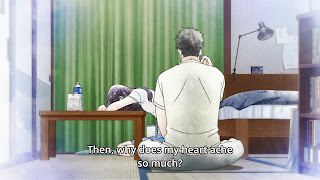Shigatsu wa Kimi no Uso (Your Lie in April) Episode 5
This episode had many captivating moments that pull you into
investing yourself into these characters. These moments were primarily constituted
of effective use of unbalanced framing, tight/extreme close ups and timely insert
shots.
The Hospital Scene
 |
 |
 |
 |
 |
 |
The mini-flashback starts with an insert shot of Kousei
pressing the piano key. This drives the point that he did try playing but still
unable to hear his own music. The extreme close up of his eyes is to show him envisioning
his performance with Kaori that he wants to recreate. Another insert shot of
his finger hitting the key shows how out of reach that moment is. Seeing him
repeatedly hitting the key only to just hear a thud adds so much melancholy to
this sequence. The extreme close up of his ear is a visual of the sound of the piano
not reaching him. All of these insert shots and close ups serve as emotional build
up to when it finally cuts to an evocatively sad full-shot of him covering his
ears. This last shot is also an unbalanced one (small lead room), which creates
a visual of his seclusion from his music.
Also, the camera was shaky and was shifting in and out of
focus. The combination of these effects, created an unnerving feeling that emphasized
Kousei’s struggle and pain.
 |
 |
 |
 |
 |
 |
The dialogue after the flashback refrained from showing the
characters’ full face until the end of scene. This made the dialogue, voice
acting and the body language of the characters the main focus. With just the
body in view the movements become more expressive. Kaori slightly shifting
shows her interest on why Kousei isn’t playing the piano, and Kousei responding
with that little shrug expresses discouragement. Again, everything serves as an
emotional set-up for the full shot when Kaori asks Kousei if he will be able to
forget their performance.
"I won’t forget"
 |
 |
 |
 |
 |
 |
In this sequence insert shots are used in conjunction with a
POV tracking shot. This time the shaky cam and shifting of focus worked
together to simulate not only Kousei’s running motion but also his excitement.
The running footsteps with rainwater splashing, the door bursting open, and the
turning of the door knob all culminate to the moment when he looks at his piano
with passion in his eyes.
 |
 |
 |
This part of the scene strongly broke the rule of thirds but
it worked quite well. The shots framing the characters at the far side provided
contrast for the last shot, which is centered. This contrast augmented the
importance of the centered shot, where Kaori faints. The use of rays of light
as diagonal leading lines also made the far sided shots feel less unbalanced by
directing the viewers’ eyes to the subject. Diagonal lines also tend to make a
shot feel more dynamic, which fits uplifting feeling of this sequence.


Comments
Post a Comment